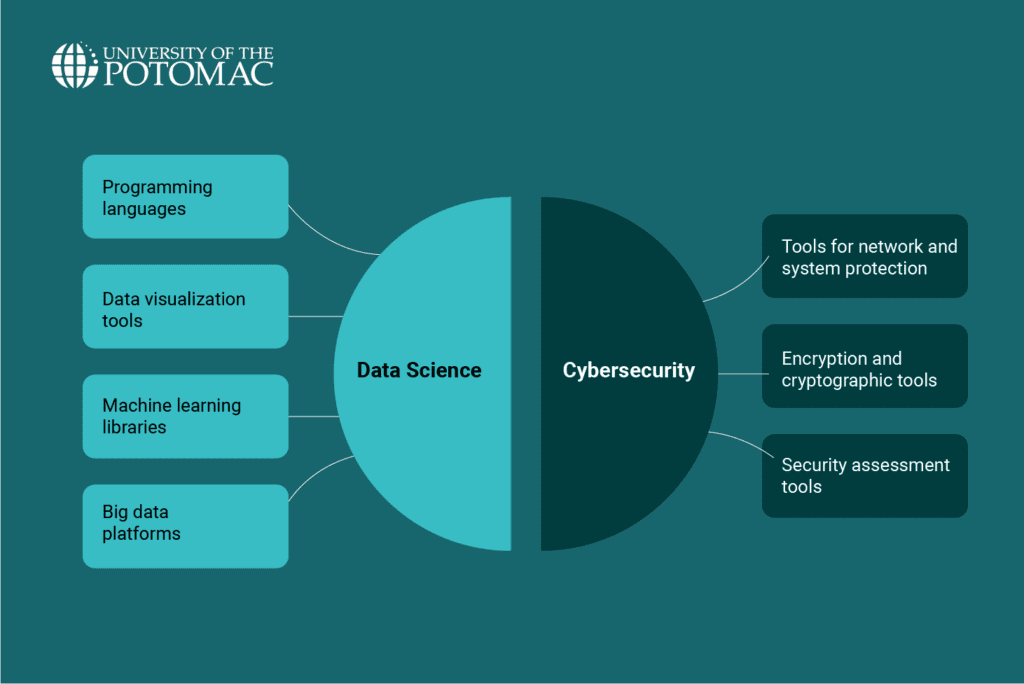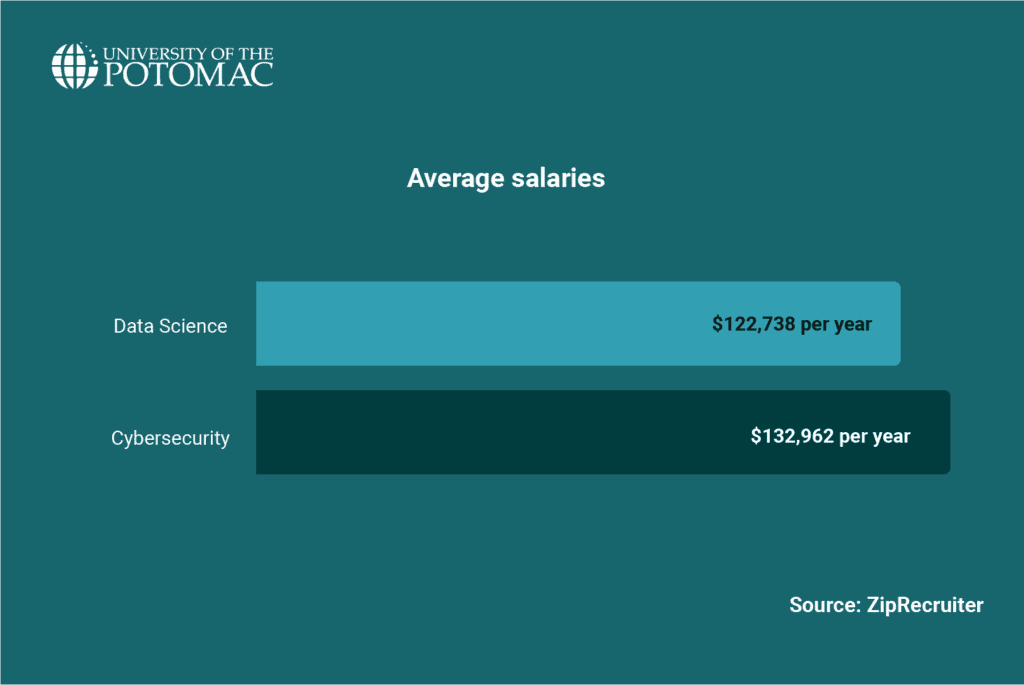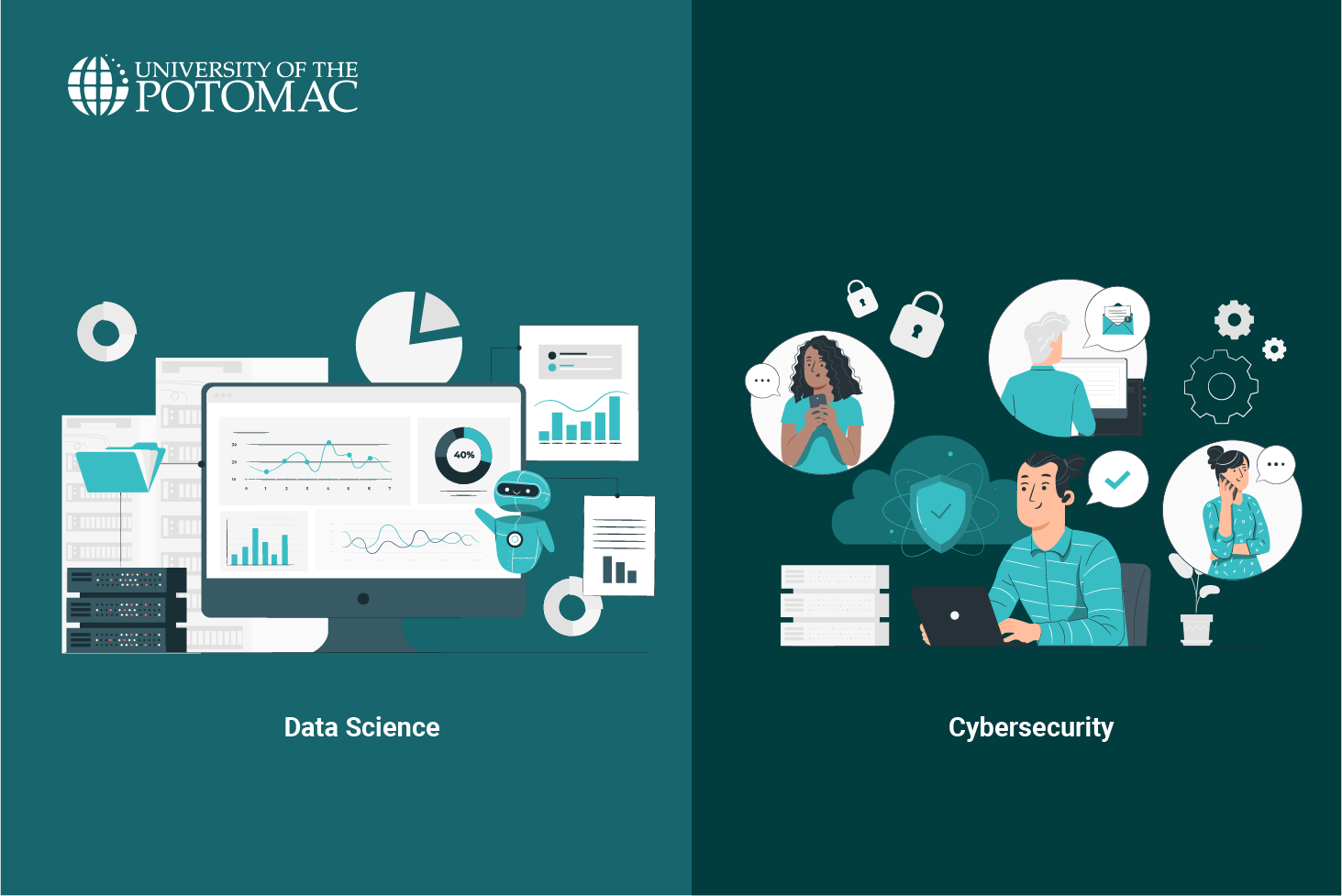Key Takeaways
- Data science involves analyzing large datasets to extract meaningful insights and inform decision-making.
- Cybersecurity protects systems, networks, and data from unauthorized access and cyber threats.
- Data science and cybersecurity differ in their focus, the tools they use, the career paths they offer, their work environment, salaries, and the associated job outlook.
Each time you browse through a blog like this, visit a website, or use any online platform, you’re automatically adding to the continuous flow of data that gets generated. Clicking, scrolling, searching—it all contributes to a growing digital footprint.
Considering the massive amounts of data being produced, it’s evident that fields related to managing and analyzing this data provide solid career prospects. It’s also clear that there are numerous career opportunities focused on data. Two of the most sought-after fields are data science and cybersecurity.
While these two fields differ in several key aspects, they also share similarities. To help you decide which might be the better fit for you, let’s compare data science vs. cybersecurity.
What Is Data Science?
Data science, one of the highest-paying jobs, is quite a broad field as it combines elements of statistics, computational science, and various analytical techniques in order to extract meaningful insights from both structured and unstructured data. It typically involves the use of algorithms and data processing methods to understand the data sets and find patterns.
After that, experts in this field utilize various visualization tools to present their insights and, in collaboration with the rest of the team, inform decision-making.
What Is Cybersecurity?
Cybersecurity represents the practice of protecting systems, networks, and data in general from digital attacks or unauthorized access. The field involves a range of activities, from securing networks and devices to ensuring that all sensitive data is protected through encryption and other safeguards.
With the constant rise of new threats, cybersecurity has become crucial for both organizations to protect their operations and for individuals to secure their personal information.
Key Differences Between Data Science and Cybersecurity
The fields of data science and cybersecurity are certainly among the most sought-after career options. They both have become a crucial part of businesses in many industries and have improved the way organizations function, how they make decisions, and the best options to protect their assets.
However, despite their similarities and cases of overlap, their overall focus, purpose, tools, work environment, career pathways, and salary expectations differ.
Focus and purpose
The primary focus of data science is to extract meaningful insights and patterns from raw data. Its purpose is to transform that data and all the insights it holds into actionable knowledge that organizations can utilize to improve operations, make predictions about potential future trends, and use the information to solve problems.
Cybersecurity, on the other hand, focuses on the safety and privacy of digital infrastructure, thus maintaining trust in digital systems. Its purpose is to prevent data breaches, mitigate risks from hacking, and respond to ongoing threats that could jeopardize sensitive information.
So, the difference between the two is that while data science helps unlock the value of data, cybersecurity is the one that safeguards it.
Tools and technologies

Professionals in both data science and cybersecurity rely on various tools and technologies in order to perform their tasks. However, the tools, and more importantly, what those tools focus on, differ.
Data scientists utilize a variety of programming languages, tools, and platforms to process, analyze, and visualize data. Python, R, and SQL are among the most common programming languages used by these professionals. These languages are needed for data manipulation, running algorithms, and querying databases.
Once the data is processed, data visualization tools like Tableau, Power BI, and Matplotlib are usually employed in order to transform raw data into visual insights that decision-makers, who may not necessarily be familiar with data science, can easily understand. For more complex tasks, machine learning libraries such as TensorFlow enable data scientists to build predictive models and identify patterns that may not be immediately apparent in the data.
In cases when they must work with massive datasets, then big data platforms like Hadoop and Apache Spark come into play. They allow data scientists to manage and process large amounts of information efficiently, making it possible to analyze vast data sets from different sources and formats.
When it comes to cybersecurity, some of the tools used include firewalls, antivirus software, and intrusion detection systems like Snort, all of which are used to monitor and defend network traffic from potential threats. Encryption tools such as OpenSSL and VeraCrypt also help ensure that sensitive data is securely stored and transmitted, protecting it from interception by cyber criminals.
If cybersecurity experts seek proactive defense and real-time incident response, tools like Nessus and Metasploit help them assess vulnerabilities and simulate attacks. This way, they can identify weaknesses in security measures and take the necessary steps to improve.
Work environment
Data scientists can be found working in many different settings, including corporate offices, tech companies, or even remotely. Industries such as finance, healthcare, marketing, and e-commerce, more often than not, rely on data science teams in order to analyze trends and improve their business strategies.
The work is generally project-based, and data scientists spend a significant amount of time analyzing datasets, creating models, and preparing reports or visualizations. Therefore, the nature of the job is often independent, although collaboration with other departments, such as marketing or product management, is common.
Compared to that, cybersecurity professionals often work in more high-pressure environments, and that’s mainly because real-time response to security incidents is critical. They may work in corporate IT departments, government agencies, security firms, or as independent consultants.
The work of cybersecurity professionals often involves on-call shifts, especially for roles like threat analysts or incident responders, where immediate action is required to address potential breaches or attacks. While data science tasks can sometimes be more routine, cybersecurity roles are fast-paced and demand quick thinking and effective action to protect digital systems from ongoing risks.
Career pathways
Entry-level positions for data science graduates typically include roles such as data analyst, business intelligence analyst, or junior data scientist. As individuals in these roles gain experience and expertise or even further their education, they can move up to more senior roles. Some such roles include lead data scientist, AI specialist, or even chief data officer.
Given the wide applicability of data science, the field also enables professionals to specialize in areas such as machine learning, artificial intelligence, and big data analytics. The aim is to cater to a wide range of interests and industries.
Cybersecurity jobs at the entry level typically include positions as security analyst, IT technician, or junior penetration tester. Similar to the previous case, with experience, these professionals can also progress to higher-level roles as cybersecurity architects, managers, or chief information security officers. Some may also choose to specialize in particular areas, such as ethical hacking, risk management, or digital forensics, where they can focus on addressing specific types of threats or challenges in the field.
Salary and job outlook

The salaries for both data science and cybersecurity are highly competitive, and that’s because both are quite high in demand.
According to recent data, data science professionals can expect an average salary of $122,738 per year, though this can vary based on factors like location, experience, and industry. The field of data science is growing rapidly as businesses increasingly rely on data-driven decision-making. Demand for data scientists is projected to continue rising as the employment of these professionals is estimated to grow by 36% from 2023 to 2033, with opportunities in nearly every sector.
Interested in pursuing a degree?
Fill out the form and get all admission information you need regarding your chosen program.
This will only take a moment.
Message Received!
Thank you for reaching out to us. We will review your message and get right back to you within 24 hours.
If there is an urgent matter and you need to speak to someone immediately you can call at the following phone number:
- We value your privacy.
Cybersecurity professionals earn an average salary of $132,962 per year, with the potential for even higher earnings depending on expertise. The cybersecurity field is experiencing significant growth due to the escalating frequency and increasing complexity of cyber threats. Data shows that the employment of information security analysts is expected to grow by 33% throughout the decade.
Benefits of a Career in Data Science
With organizations across every industry increasingly relying on data science to drive their decision-making, the job security associated with this field is a huge push for people considering a career as data scientists.
As the field continues to grow, individuals can work in a variety of roles. This flexibility within the field means that professionals can specialize in areas they’re passionate about and follow a path that is both rewarding and tailored to their personal interests and skills.
On top of career diversity, data science roles also come with significant flexibility when it comes to the work environment, as many positions offer options for remote or hybrid work. This is a game-changer, especially when it comes to maintaining a healthy work-life balance.
Benefits of a Career in Cybersecurity
The rapid increase in digital attacks has certainly pointed to a shortage of skilled cybersecurity professionals, which makes this career path even more attractive.
With organizations recognizing the critical need to protect their data and infrastructure from potential breaches, the demand for experts in this area is expected to remain strong for the foreseeable future. As a result, this means that cybersecurity professionals enjoy job stability, in addition to a wide range of career opportunities and paths for advancement.
One of the most appealing aspects of cybersecurity is the subfield options provided that those learning cybersecurity can choose from. Some such subfields are network security, cloud security, and risk management. So, professionals can focus on areas that align with their interests and strengths as they work to become experts in this field.
Which Career Path Is Right for You?
Both data science and cybersecurity are genuinely great career paths. They each offer excellent opportunities and challenges that can help you grow and find fulfillment in your professional life. There’s no definitive “right” choice here—they both have value.
It’s like comparing a hammer and a screwdriver—both help us build and create but serve different purposes. We can’t imagine life without either, yet they are used in different contexts. Similarly, data science and cybersecurity are key to how we interact with technology and data.
Still, to help you decide between the two fields, you should:
- Consider your own interests: Do you find yourself more excited about working with data directly, or are you more interested in defending it?
- Think about what plays to your strengths: Do you enjoy tasks that involve data manipulation, coding, and solving problems, or do you like fast-paced environments and are good at making quick decisions in high-pressure situations?
- Take into account the type of work environment you prefer: Data science roles often come with more flexibility, like remote or hybrid work options, while cybersecurity tends to require more hands-on, real-time work, often with shift work or on-call duties.
- Look at potential career paths: Both options offer plenty of career opportunities and areas for specializing. It’s all a matter of what specific position interests you.
- Evaluate the educational requirements: Data science typically calls for a solid foundation in computer science, programming, and statistics, while cybersecurity professionals may need specific training or certifications, such as CISSP or CompTIA Security+.
- Think about where you want to be in the long run: Are you more excited by the prospect of spending years solving complex problems through data, or are you more driven by the challenge of protecting information and staying ahead of cybercriminals?
The Bottom Line
Data science and cybersecurity are integral fields that offer valuable opportunities for professionals looking to work in high-demand industries with excellent earning potential. However, while both fields are essential and growing rapidly, one should resonate with you more based on your skills, interests, and career goals.
Choosing the right field is just as important as selecting the right program to help you succeed in it. The insights shared here should guide you in identifying which path aligns best with your aspirations, and we are here to support you in finding the right program as well by providing both a Data Science Program and a Cybersecurity BA Program.
We’re committed to equipping you with the knowledge and skills needed to excel in whichever of these two career paths that you decide to pursue.
Frequently Asked Questions (FAQs)
Can I switch from a data science career to cybersecurity (or vice versa)?
Certainly! Transitioning between these two fields is possible, especially if you build relevant skills in the new field, though each will require focused training or certification to make the switch smoothly.
Do data science or cybersecurity roles allow remote work?
Yes, both data science and cybersecurity roles can offer remote or hybrid work options, depending on the company and specific job responsibilities.
How much programming knowledge is required for each field?
Data science requires a solid understanding of programming, particularly in languages like Python, R, and SQL. Cybersecurity typically requires less programming but still benefits from knowledge of scripting languages and system-level coding.










